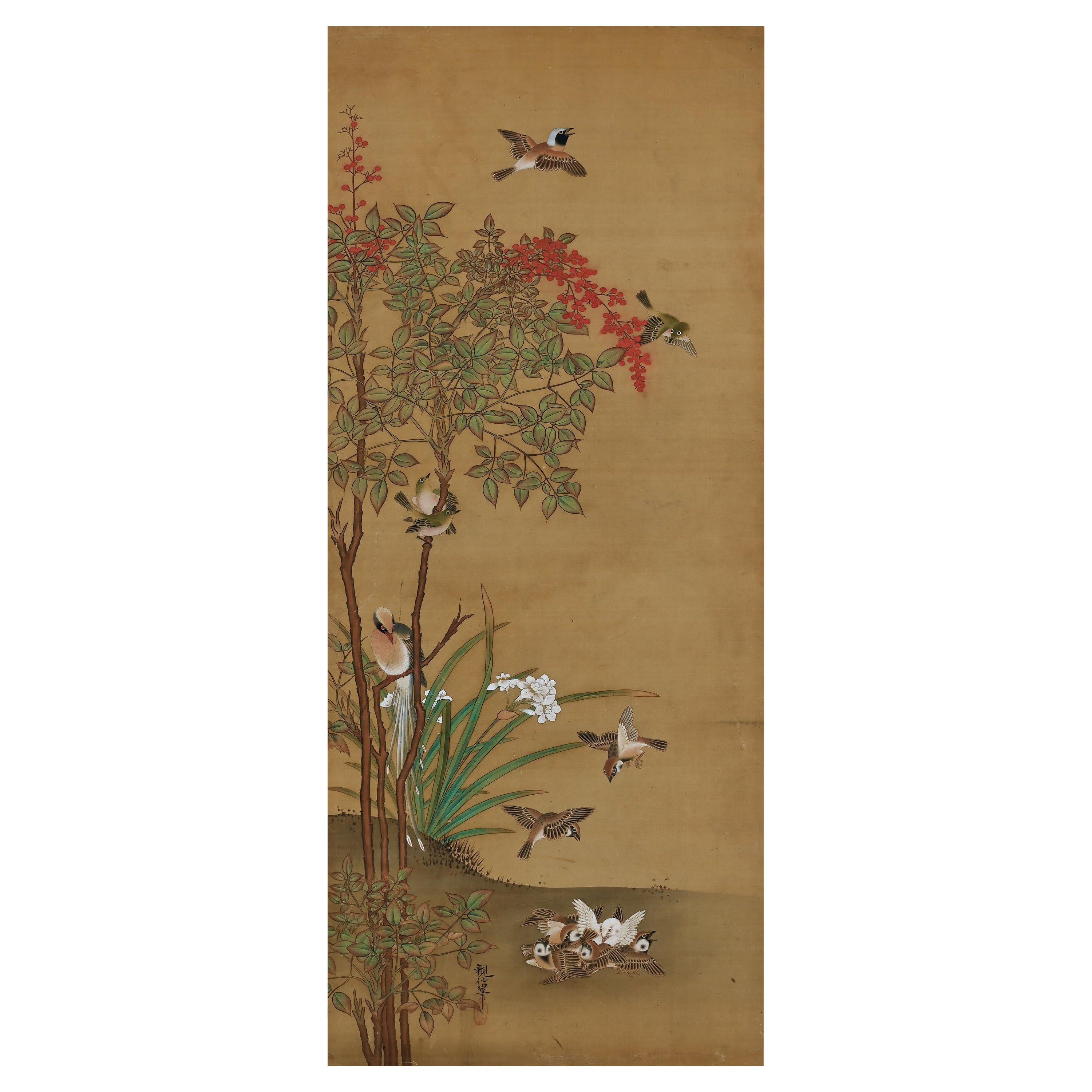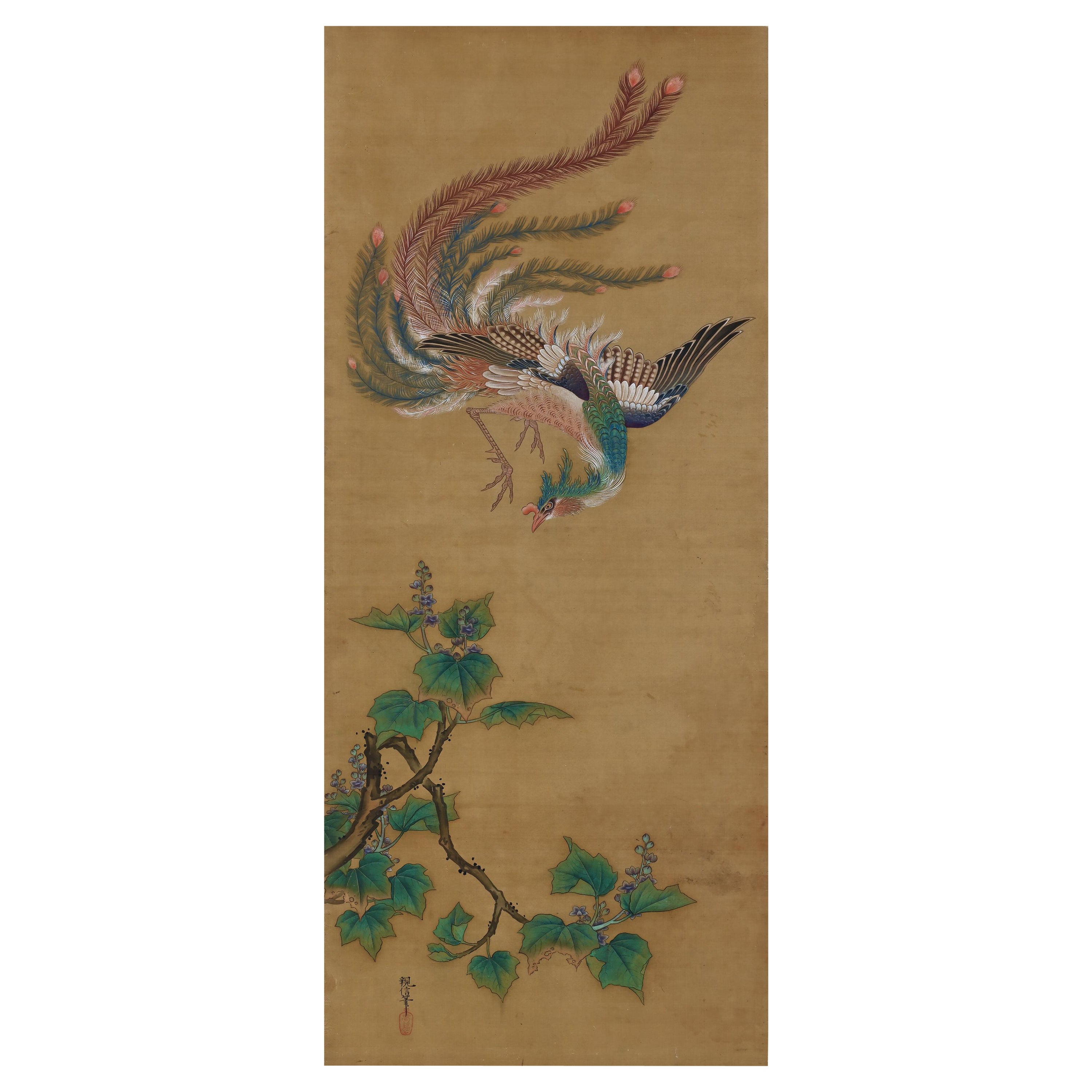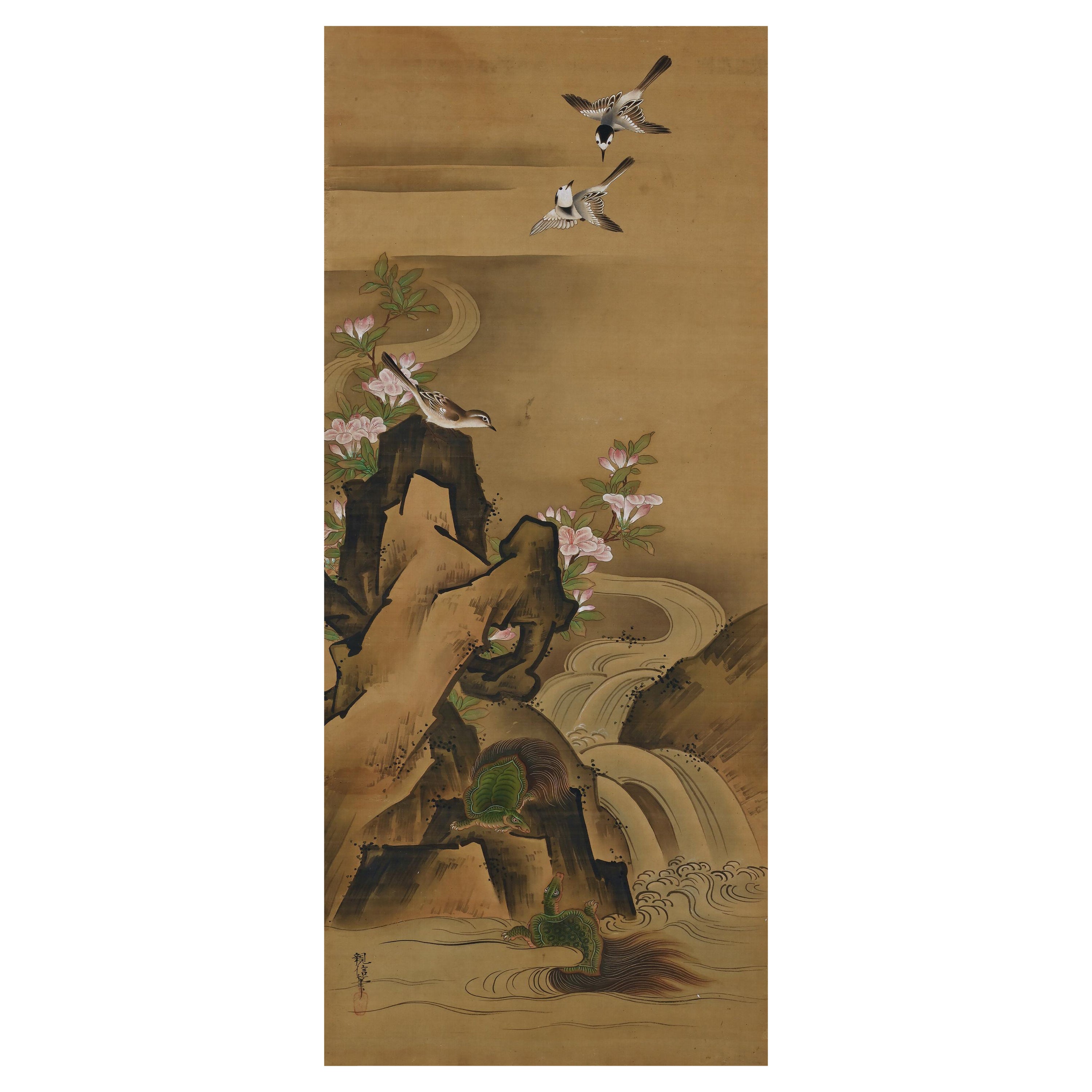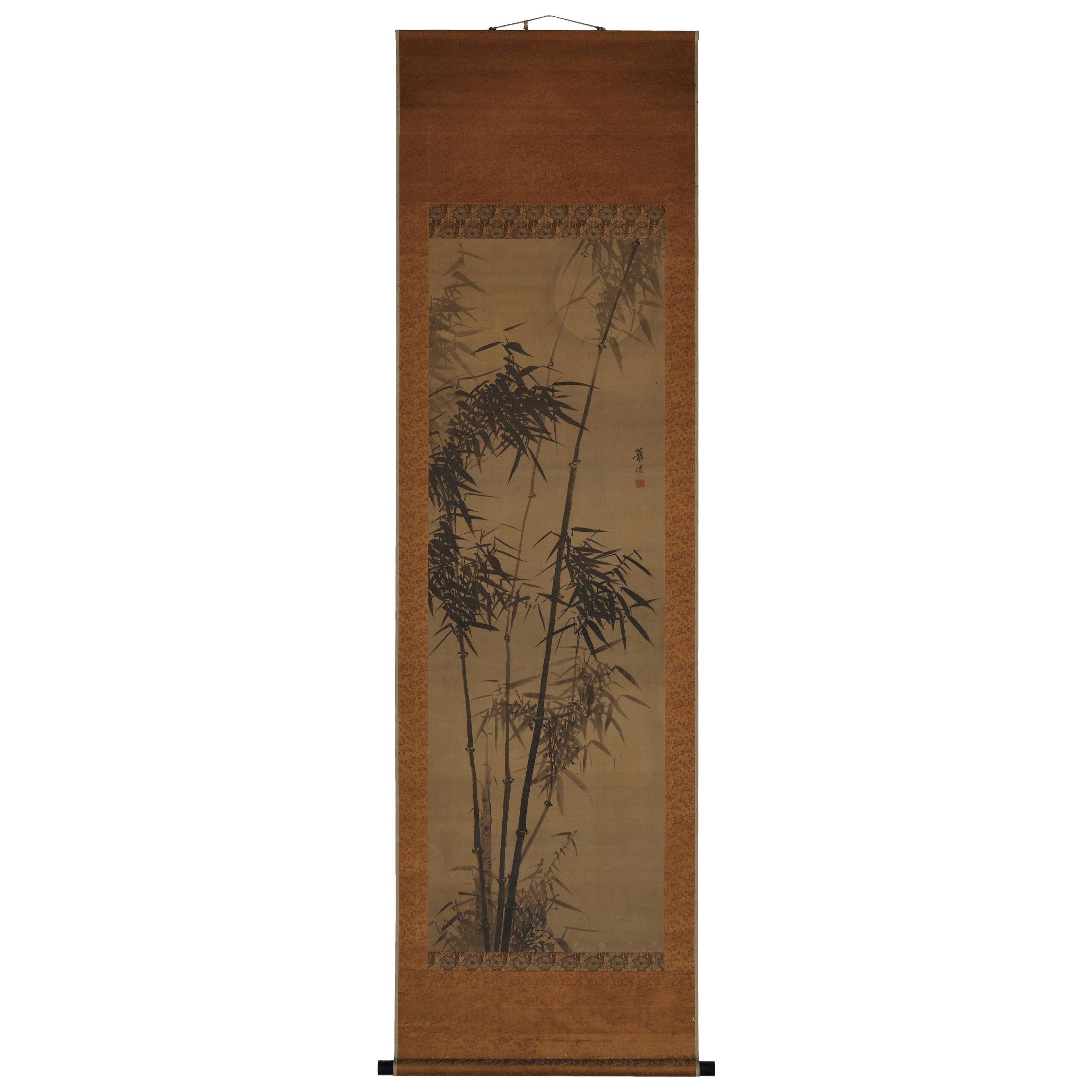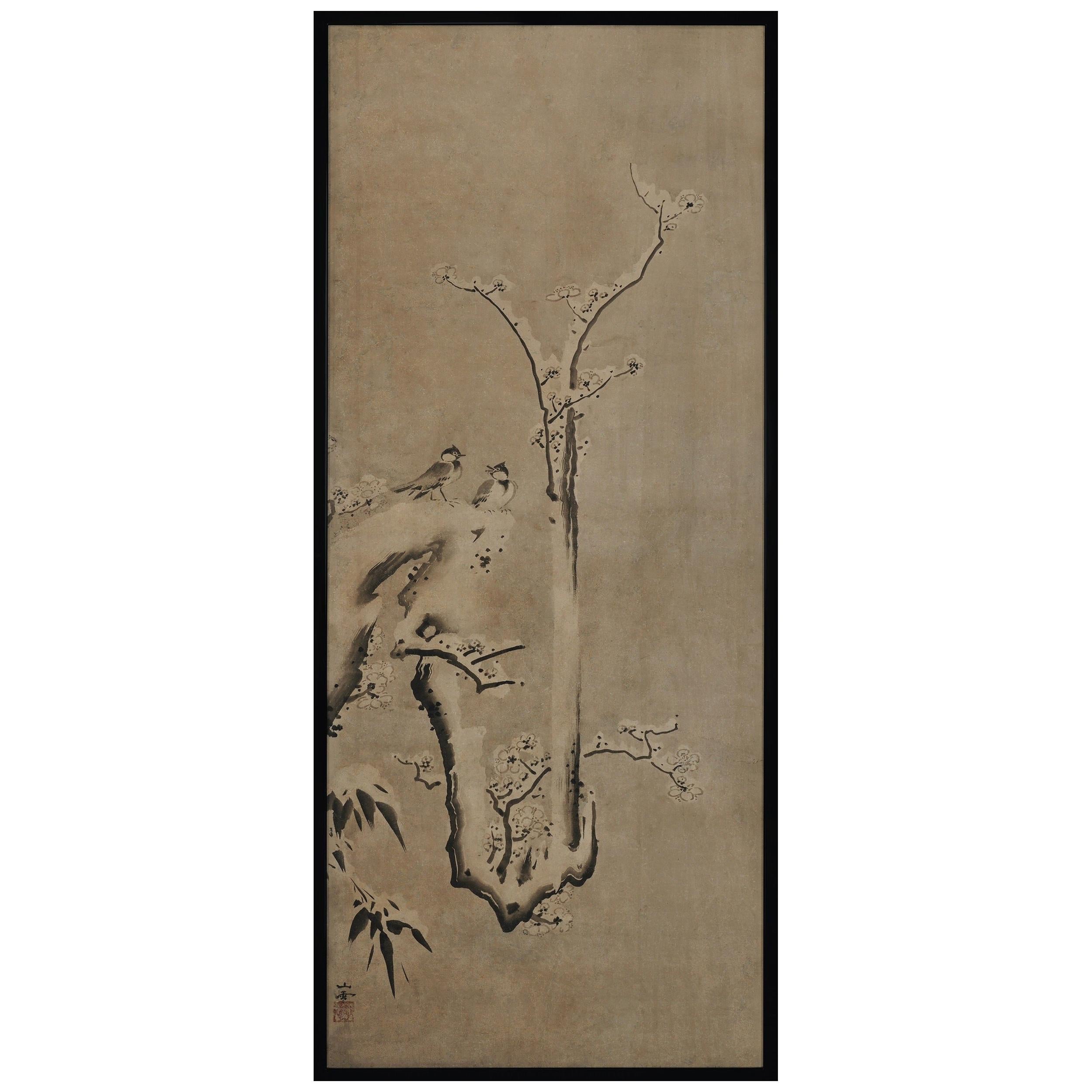Items Similar to 19th Century Japanese Silk Painting by Kano Chikanobu, Peacock & Bamboo
Want more images or videos?
Request additional images or videos from the seller
1 of 8
19th Century Japanese Silk Painting by Kano Chikanobu, Peacock & Bamboo
About the Item
Birds & Flowers of the Seasons
Pheasants & Plum in Snow
Unframed painting. Ink, pigment and gofun on silk
Kano Chikanobu 1819-1888
Signature: Chikanobu
Seal: Shateki
Offered here is an unframed ‘kacho-e’ painting by the 19th century Japanese Takamatsu domain painter Kano Chikanobu. There are 8 individual paintings available, which originally would have been part of a set of 12. ‘Kacho-e’ literally means ‘pictures of birds and flowers’. In reality it covers a wide range of natural motifs including birds, fish, insects and small animals in combination with flowers, grasses or trees. The theme has a long history in Japanese painting. It is one of three painting genres, the other two being landscape and figure, which derive from Chinese academic painting classification. As one of the accepted types of painting to be shown in official residences, scenes of birds, flowers and animals were rife with metaphorical reference as well as physical beauty.
In these paintings Chikanobu has made conspicuous use of brilliant pigments and meticulous brushwork. The rocks, water, trees, blossoms, and birds are treated as stylized formal elements in a grand design. All of the components contribute to the patterned effect and tactile richness of the surface. Beyond their highly decorative qualities, the subject of some of the paintings are also an allusion to imperial allegiance; the pheasants are symbolic of bravery and steadfastness, peacocks represent divinity and power, and the phoenix paired with paulownia a just and benevolent ruler. Cranes and turtles symbolize longevity, and the lush, full bloom of the peony flower represents wealth and opulence. Paintings of native Japanese birds and flowers were appreciated primarily for their evocation of the seasons and the traditional poetic emotions associated with them. This is the case with the spring scene of cherry blossoms and birds and the winter scene of narcissus, nandina and sparrows. The rich expression of flower and bird paintings opens our eyes not only to the beauty of the creations of nature, but also to the underlying feelings and emotions of people who cherished this genre of painting in the mid 19th century.
The artist, Kano Chikanobu, was the last official hereditory painter for the Takamatsu feudal domain (present day Kagawa Prefecture). It was his primary duty to supply paintings for his feudal lord. The domain was disbanded in 1871 but not before they fought against the reformist forces at the onset of the Meiji Restoration in 1868. It was a turbulent time in history and the Takamatsu strived unsuccessfully to retain their centuries old way of life.
The paintings have recently been restored in Kyoto utilizing traditional materials and techniques. Fresh backing papers have been applied to the silk in preparation for presentation in a western style frame. Amongst the work carried out during restoration was the cleaning of water damage, repair of holes with replacement silk, reinforcement of cracked silk and touch-ups of the background. There has been no re-painting of the images.
- Dimensions:Height: 46 in (116.84 cm)Width: 19.5 in (49.53 cm)Depth: 0.01 in (0.26 mm)
- Style:Edo (Of the Period)
- Materials and Techniques:
- Place of Origin:
- Period:
- Date of Manufacture:circa 1850
- Condition:Repaired: Recently restored in Kyoto. Traditional craftsmen and techniques. Work included washing, stain removal, repair of damages with replacement silk and reinforcement of cracked silk. The paintings are ready to be presented in a western style frame. Wear consistent with age and use.
- Seller Location:Kyoto, JP
- Reference Number:1stDibs: LU2472325348662
About the Seller
5.0
Recognized Seller
These prestigious sellers are industry leaders and represent the highest echelon for item quality and design.
Gold Seller
These expertly vetted sellers are highly rated and consistently exceed customer expectations.
Established in 2001
1stDibs seller since 2016
62 sales on 1stDibs
Typical response time: 6 hours
- ShippingRetrieving quote...Ships From: Kyoto, Japan
- Return PolicyA return for this item may be initiated within 10 days of delivery.
More From This SellerView All
- 19th Century Japanese Silk Painting by Kano Chikanobu, Sparrows & NandinaLocated in Kyoto, JPBirds & flowers of the seasons Pheasants & plum in snow Unframed painting. Ink, pigment and gofun on silk Kano Chikanobu 1819-1888 Signature...Category
Antique Mid-19th Century Asian Edo Paintings and Screens
MaterialsSilk
- 19th Century Japanese Silk Painting by Kano Chikanobu, Phoenix & PaulowniaLocated in Kyoto, JPBirds & Flowers of the seasons Pheasants & Plum in Snow Unframed painting. Ink, pigment and gofun on silk Kano Chikanobu 1819-1888 Signature...Category
Antique Mid-19th Century Asian Edo Paintings and Screens
MaterialsSilk
- 19th Century Japanese Silk Painting by Kano Chikanobu, Turtles & AzaleaLocated in Kyoto, JPBirds & flowers of the seasons Pheasants & plum in snow Unframed painting. Ink, pigment and gofun on silk Kano Chikanobu 1819-1888 Signature...Category
Antique Mid-19th Century Asian Edo Paintings and Screens
MaterialsSilk
- Japanese Painting, Hanging Scroll, 19th Century Bamboo in MoonlightLocated in Kyoto, JPBamboo in moonlight Gamo Rakan (1784-1866) Hanging scroll, ink on silk. Dimensions: Scroll: 201 cm x 58 cm Image: 137 cm x 45 cm In this early 19th century work by Gamo Rakan a light ink wash applied to the silk background silhouettes the moon and suggests the atmosphere of early evening. Even though it is a literati subject, Rakan’s bamboo is quite realistic with a strong decorative style. The painting finds its inspiration from Chinese Ming dynasty painters who often used a single-tone, jet black stroke to emphasize the calligraphic nature of bamboo. In a different era, decorative would have been seen as somewhat unrefined. But increasingly in the Edo period, it was the hallmark of high style. The Japanese people, in particular the rising merchant class, had gradually become apathetic toward the traditional Sesshu and Kano schools of painting. Chinese professional and amateur painters living in the port of Nagasaki during the 18th century had a profound effect on Japanese painting and the freshness of their style and its decorative appeal contributed greatly to its popularity. Gamo Rakan’s teacher, Tani Buncho...Category
Antique Early 19th Century Japanese Edo Paintings and Screens
MaterialsSilk
- 17th Century Japanese Framed Painting by Kano Sansetsu, Plum Blossoms in SnowLocated in Kyoto, JPKano Sansetsu (1589-1651) Plum blossoms in snow Edo period, circa 1640 Framed painting. Ink on paper. Kano Sansetsu is a Japanese painter who...Category
Antique 17th Century Japanese Edo Paintings and Screens
MaterialsPaper
- Japanese Screen Pair, circa 1730, Peacocks and Phoenix, Kano SchoolLocated in Kyoto, JPPhoenix and Peacocks. A pair of six-panel Japanese folding screens by Tsunetake Yotei (n.d.) First half of the 18th century. The signature reads 67 year old Tsunetake. The seals read: -Tsunetake no in, -Yotei, -Seishin Dimensions: Each screen – H. 69” x W. 149” (176 cm x 378 cm) A pair of Kano Grand Picture (Waga) screens depicting phoenix and peacocks rich with symbolic meaning. Dating to the first half of the 18th century, from the Kobikicho Kano school in Edo, this pair of folding...Category
Antique Early 18th Century Asian Edo Paintings and Screens
MaterialsGold Leaf
You May Also Like
- 19th Century Japanese Edo Six Panel Kano School Landscape ScreenLocated in Rio Vista, CALate Edo period 19th century Japanese six-panel landscape screen featuring a cypress tree over a flowering hibiscus with a pair of hototogisu birds. Kano school painted with ink and ...Category
Antique 19th Century Japanese Edo Paintings and Screens
MaterialsSilk, Wood, Paper
- Antique Japanese Six-Panel Screen by Kano ChikanobuLocated in Prahran, VictoriaLate 17th century Kano school peony landscape screens. One of a pair of screens signed: Hogan Josen Fujiwara Chikanobu Hitsu - Kano Chikanobu (Shushin) ...Category
Antique Early 18th Century Japanese Edo Paintings and Screens
MaterialsGold Leaf
- Japanese Antique Ink Painting / 19th Century / Rare Chinese Character PaintingLocated in Sammu-shi, ChibaWe have a unique Japanese aesthetic sense. And only we can introduce unique items through our purchasing channels in Japan and the experience we have gained so far, in such a way that no one else can imitate. It is an ink painting written after the Meiji era. The biggest attraction of this work is that it uses Chinese characters to create paintings. To explain in detail, it is written here in Chinese characters as "un-ryu" . "Un" is a cloud and "ryu" is a dragon. These are embodied and drawn by comparing them to the meaning of Chinese characters. And the clouds depict the clouds hanging over the mountain, and the dragon depicts the climbing toward the mountain. Humorous paintings...Category
Antique Late 19th Century Japanese Edo Paintings
MaterialsAcrylic, Paper
- Antique Japanese Six-Panel Screen by Kano Chikanobu "Shushin"Located in Prahran, VictoriaLate 17th century Kano school peony landscape screens. Both screens signed: Hogan Josen Fujiwara Chikanobu Hitsu - Kano Chikanobu (Shushin) (1660 - 1728...Category
Antique Early 18th Century Japanese Edo Paintings and Screens
MaterialsGold Leaf
- 18th Century Japanese Kano School Landscape ScreenLocated in Prahran, VictoriaJapanese Kano school screen with pine tree, camellias, cherry blossom and Chinese figures in the landscape, circa 18th century. Materials: Pigmen...Category
Antique 18th Century Japanese Paintings and Screens
MaterialsSilver Leaf
- 19th Century Japanese Edo Screen Kano School Garden TerraceLocated in Rio Vista, CAFantastic 19th century Japanese Edo/Tokugawa period two-panel byobu screen featuring Chinese children frolicking on a garden terrace with a pavilion and large pine tree. Made in the ...Category
Antique 19th Century Japanese Edo Paintings and Screens
MaterialsBrass, Gold Leaf
Recently Viewed
View AllMore Ways To Browse
Antique Silk Paintings
Japanese Painting 19th
19th Century Japanese Paintings
Japanese Silk Painting
Silk Pictures
Antique Silk Flowers
Antique Painting On Silk
Asian Silk Art Painting
Watered Silk
Antique Japanese Silk
Mid Century Asian Painting
Japanese Paintings On Silk
Silk Painting Japan
Asian Silk Screens And Paintings
Silk Screen Paintings
Japanese Painted Silk
Asian Midcentury Artist
Antique Japanese Silk Art
